

Superpower. A superpower is a state with a dominant position in international relations and is characterised by its unparalleled ability to exert influence or project power on a global scale.
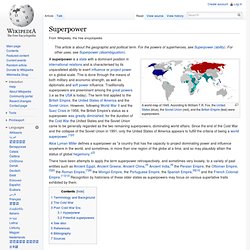
This is done through the means of both military and economic strength, as well as diplomatic and soft power influence. Traditionally superpowers are preeminent among the great powers (i.e as the USA is today). Polarity in international relations. Polarity in international relations is any of the various ways in which power is distributed within the international system.
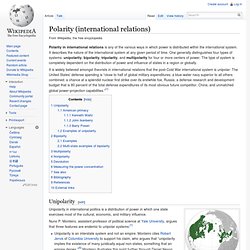
It describes the nature of the international system at any given period of time. One generally distinguishes four types of systems: unipolarity, bipolarity, tripolarity, and multipolarity for four or more centers of power. Diplomatic immunity. Diplomatic immunity is a form of legal immunity that ensures that diplomats are given safe passage and are considered not susceptible to lawsuit or prosecution under the host country's laws, although they can still be expelled.
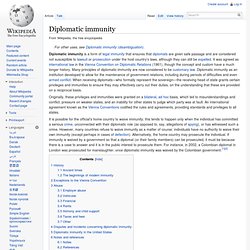
It was agreed as international law in the Vienna Convention on Diplomatic Relations (1961), though the concept and custom have a much longer history. Many principles of diplomatic immunity are now considered to be customary law. Diplomatic immunity as an institution developed to allow for the maintenance of government relations, including during periods of difficulties and even armed conflict. When receiving diplomats—who formally represent the sovereign—the receiving head of state grants certain privileges and immunities to ensure they may effectively carry out their duties, on the understanding that these are provided on a reciprocal basis. History[edit] Ancient times[edit] The Diplomat.
I Want Your Job: Foreign Office diplomat - Getting a Job, Career Planning. What does your job involve?

Policy jobs at the Foreign Office are either based around a country or region, like Pakistan or Africa; or a theme, like counter-terrorism or human rights. I'm head of a team working on the European Union's common foreign policy, which is where the 27 member countries of the EU act together externally.
That might mean the EU training Iraqi judges and prosecutors; running a border checkpoint with the Palestinians between Gaza and Egypt; or calling on the Sudanese president to accept blue-helmeted UN peacekeepers in Darfur. When an action is proposed, we look at the legal base for it, its budget and, more broadly, what the UK thinks about it. Why do you love your job? International affairs is a fascinating area to work in. Plus, it's always varied.
As you see, we move between jobs quite frequently, so you might be working on arms control, then switch to economic relations with China. What's tough about it? It's definitely challenging. No. Career Center Article - So, You Want to Be a Diplomat? September 4, 2012 Leslie (Les) McBee, Diplomat in Residence (DIR) at Cal from 2005-2007, offers his insights about how to prepare for an international affairs career and life as a diplomat.
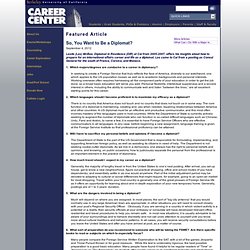
Les came to Cal from a posting as Consul General for the south of France, Corsica, and Monaco. 1. Which majors/degrees are conducive to a career in diplomacy? In seeking to create a Foreign Service that truly reflects the face of America, diversity is our watchword, one which applies to the US population mosaic as well as to academic backgrounds and personal interests. 2. There is no country that America does not touch and no country that does not touch us in some way. 3. The Geographical Pivot of History. "The Geographical Pivot of History" was an article submitted by Halford John Mackinder in 1904 to the Royal Geographical Society that advanced his Heartland Theory.[1] In this article, Mackinder extended the scope of geopolitical analysis to encompass the entire globe.
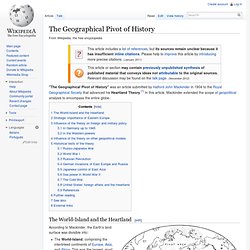
Diplomat. Diplomats are the oldest form of any of the foreign policy institutions of the state, predating by centuries foreign ministers and ministerial offices.
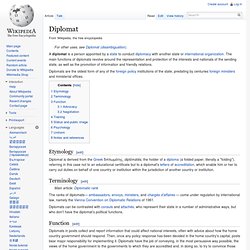
Etymology[edit] Diplomat is derived from the Greek διπλωμάτης, diplōmátēs, the holder of a diploma (a folded paper, literally a "folding"), referring in this case not to an educational certificate but to a diplomat's letters of accreditation, which enable him or her to carry out duties on behalf of one country or institution within the jurisdiction of another country or institution. Terminology[edit] Function[edit] Diplomats in posts collect and report information that could affect national interests, often with advice about how the home country government should respond. In general, it has become harder for diplomats to act autonomously. Secure email has transformed the contact between diplomats and the ministry. Advocacy[edit] Negotiation[edit] Training[edit] Status and public image[edit] Psychology[edit] Diplomatic corps. Diplomatic Corps plaque used on some Embassies and Diplomatic Missions.
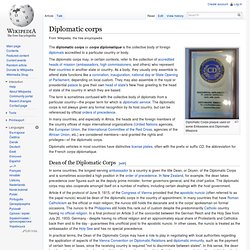
Diplomacy. Diplomacy (from the Greek δίπλωμα, meaning a folded paper or document) is the art and practice of conducting negotiations between representatives of states.
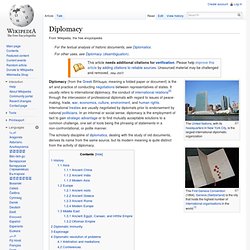
It usually refers to international diplomacy, the conduct of international relations[2] through the intercession of professional diplomats with regard to issues of peace-making, trade, war, economics, culture, environment, and human rights. International treaties are usually negotiated by diplomats prior to endorsement by national politicians.